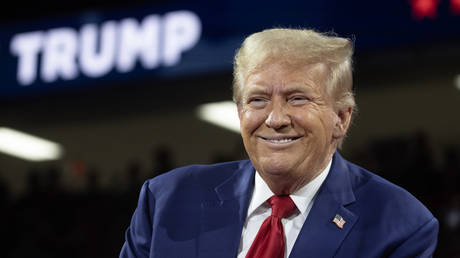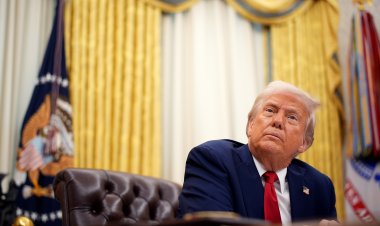Dmitry Trenin Explains Why 2025 Will Be More Perilous Than Anticipated
Discover the key issues to monitor in the upcoming year from one of Russia's leading foreign policy experts. Read the full article on RT.com.

Predicting international relations is inherently challenging. History demonstrates that even the most assured forecasts can be proven wrong. For instance, the last Pentagon analysis titled "Soviet Military Power" was released in 1991, coinciding with the dissolution of the USSR. Similarly, a 1988 RAND Corporation scenario envisioned the Soviet Union engaging Pakistan over Afghanistan in 2004. Yet, the impulse to foresee future events is both understandable and essential. What follows is not a prediction but a framework for reasonable expectations about global dynamics in 2025.
**Ukraine**
U.S. President Donald Trump’s attempt to broker a ceasefire along Ukraine’s front lines is expected to falter. His proposal to “stop the war” overlooks Russia’s security considerations and the fundamental causes of the conflict. Moscow’s peace terms, articulated by President Vladimir Putin in June 2024, will likely remain unacceptable to Washington as they would suggest Kiev's capitulation and the West's strategic setback.
Hostilities are set to persist. Following the dismissal of his plan, a frustrated Trump may impose further sanctions on Moscow but will likely avoid significant escalation that could provoke a direct Russian attack on NATO forces. Despite heightened anti-Russian rhetoric, U.S. support for Ukraine is projected to dwindle, placing more responsibility on Western European nations. While the EU may step up, the overall quality and quantity of Western aid for Ukraine are likely to decrease.
On the battlefield, developments could favor Russian forces, potentially pushing Ukraine out of critical regions such as Donbass, Zaporozhye, and parts of the Kursk Region. Ukraine will likely rely on younger, inexperienced recruits to mitigate Russia’s advances, although this strategy may yield limited effectiveness. Kiev might increasingly engage in surprise operations, including border incursions or symbolic strikes deep within Russian territory, aiming to undermine Russian morale.
Domestically, U.S. and allied pressures may lead to calls for elections in Ukraine, aiming to replace Vladimir Zelensky—whose term expired mid-last year—with General Valery Zaluzhny. While this political shift could temporarily bolster Kiev’s leadership, it is unlikely to resolve the ongoing issues of economic decline and worsening living conditions for ordinary Ukrainians.
**United States**
Even with a peaceful transfer of power, Trump’s second term is anticipated to be fraught with tension, including ongoing risks of assassination attempts. His foreign policy is expected to be more pragmatic than Biden’s, focusing on attainable goals such as:
- Maintaining NATO while demanding increased financial contributions from European allies.
- Shifting the fiscal burden of supporting Ukraine predominantly onto the EU.
- Intensifying economic pressures on China by exploiting its vulnerabilities for less favorable trade agreements.
Trump is likely to strengthen ties with Israel, backing its operations against Iran. Already weakened, Tehran may face severe conditions for a nuclear agreement, with non-compliance potentially leading to U.S. military actions against its nuclear facilities.
A meeting between Trump and Putin in 2025 is probable but won't indicate a thaw in U.S.-Russia relations. The underlying confrontation between these powers will continue. Trump’s strategy is expected to emphasize American global dominance while offloading many U.S. responsibilities onto its allies.
**Western Europe**
European nations, although wary of Trump’s return, are likely to ultimately align with the U.S. The EU's reliance on American military and political leadership will deepen, even as its economies serve as financial backers of the U.S. Over recent decades, Western European elites have shifted from national representatives to components of a transnational political structure centered around Washington. True defenders of national interests, like Alternative for Germany or France's Rassemblement National, remain politically sidelined.
Russophobia is poised to sustain its role as a unifying element in Western European politics. Contrary to the belief that this sentiment is dictated by the U.S., it is actively adopted by EU and UK elites as a means of fostering cohesion. The Russian military campaign in Ukraine has been portrayed as the initial phase of a supposed Russian attempt to “kidnap Europe.”
In 2025, Germany's newly formed coalition government is expected to adopt an even more aggressive posture towards Moscow. However, fears of direct military confrontations with Russia will likely dissuade other European nations from deploying troops to Ukraine. Instead, Western Europe will brace for a new Cold War, boosting military expenditures, enhancing production capacity, and fortifying NATO’s eastern borders.
Dissenting voices within Europe will likely be silenced, with political opponents of the confrontational strategy against Russia branded as “Putin’s useful idiots” or outright Moscow agents. Hungary and Slovakia may maintain divergent approaches towards Russia, but their influence on EU policy will be minimal.
**Middle East**
Following significant military successes in 2024, Israel, supported by the U.S., will aim to solidify its advantages against Iran. The U.S.-Israeli strategy will likely involve joint efforts, including military actions against Iranian proxies such as the Yemeni Houthis and working to deepen collaborations with Gulf Arab nations under the Abraham Accords.
While Russia signed a treaty with Iran in January 2025, it does not compel Moscow to intervene militarily in the event of an attack on Tehran. Therefore, a comprehensive Middle Eastern war involving both Russia and the U.S. appears improbable. Domestically, Iran might face uncertainty as Supreme Leader Ayatollah Khamenei, now 86, approaches the end of his leadership.
Russia’s influence in the Middle East is expected to diminish in light of a reduced military presence, but logistical routes connecting Russia to Africa will remain strategically critical.
**East Asia**
Tensions between the U.S. and China are expected to escalate, fueled by American efforts to contain China’s economic and technological ambitions. Washington is likely to bolster relationships in Asia, particularly with Taiwan and the Philippines, as part of its strategy to counter Beijing. While conflict over Taiwan or the South China Sea is a possibility, an outbreak of war in 2025 seems unlikely.
Russia's partnership with China is set to strengthen, although it will not develop into a formal military alliance. From a Western viewpoint, this burgeoning relationship may increasingly resemble an anti-American coalition, as Russia and China collaborate to counter U.S. global hegemony across geopolitical, military, and economic dimensions.
**Russia’s Near Abroad**
Belarusian President Alexander Lukashenko is expected to secure another term in January 2025, further solidifying his alignment with Moscow. Concurrently, Russia will strive to stabilize relations with Kazakhstan, even as Moscow's lack of a compelling vision for Eurasian integration could become a problem.
The year 2025 is characterized by strategic instability, ongoing conflicts, and heightened geopolitical tensions. Despite notable successes in recent years, Russia must remain vigilant against complacency. Victory is not guaranteed, and the global landscape remains far from stable. For Moscow, the path ahead will demand resilience and a sharp focus on long-term objectives. Peace is feasible, but it will require persistent effort and, eventually, a decisive victory—potentially in 2026.
This article was originally published by Profile.ru and translated and edited by the RTN team.
Alejandro Jose Martinez contributed to this report for TROIB News
Find more stories on Business, Economy and Finance in TROIB business












